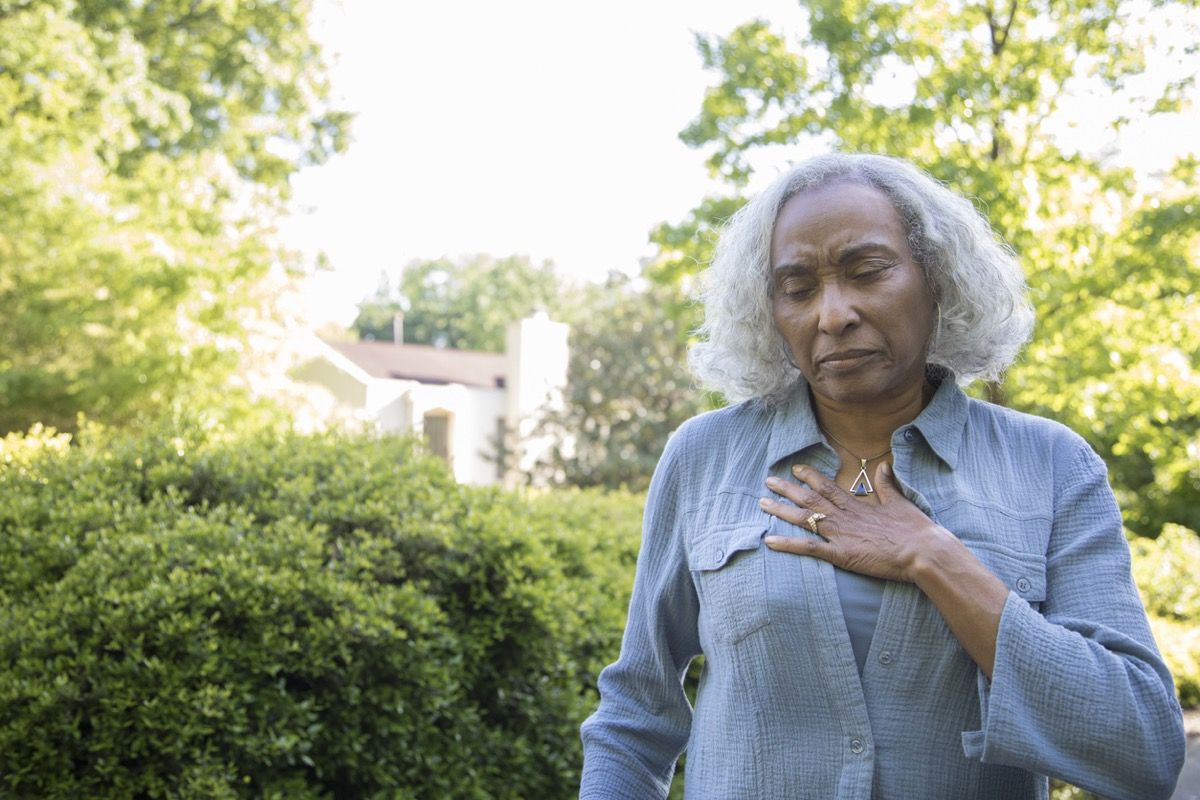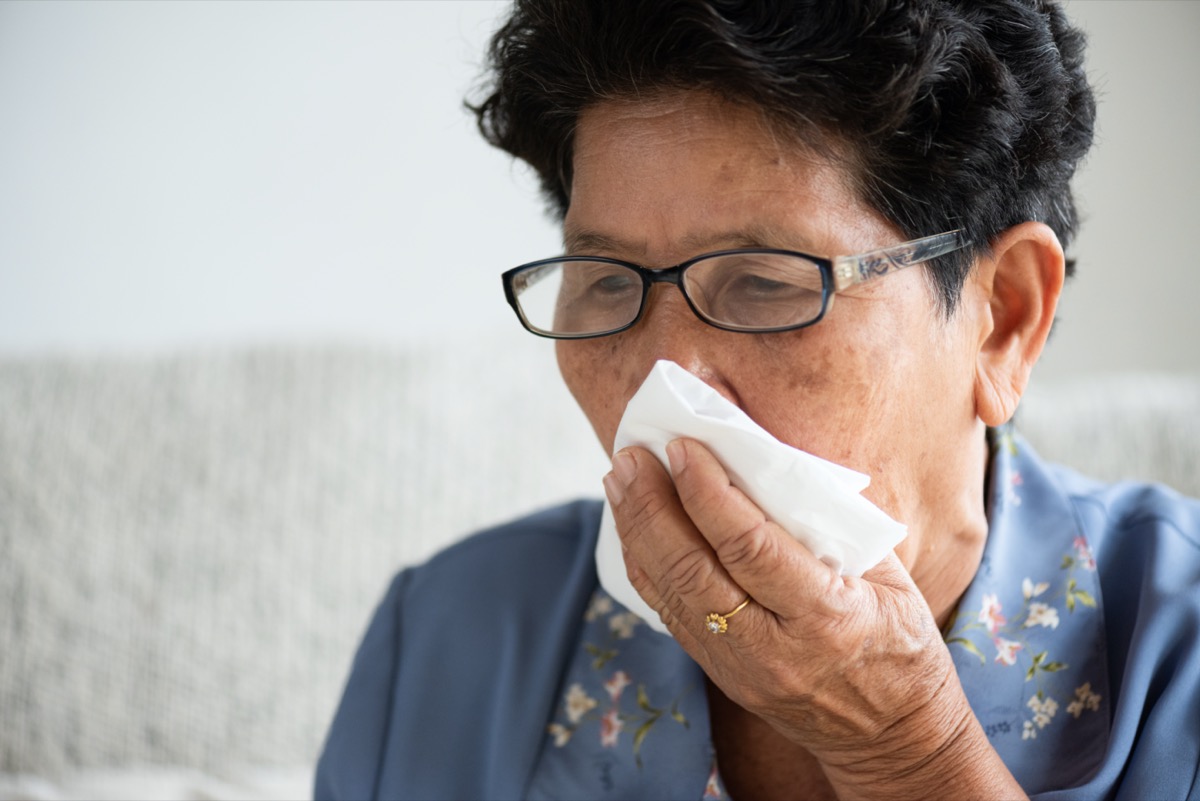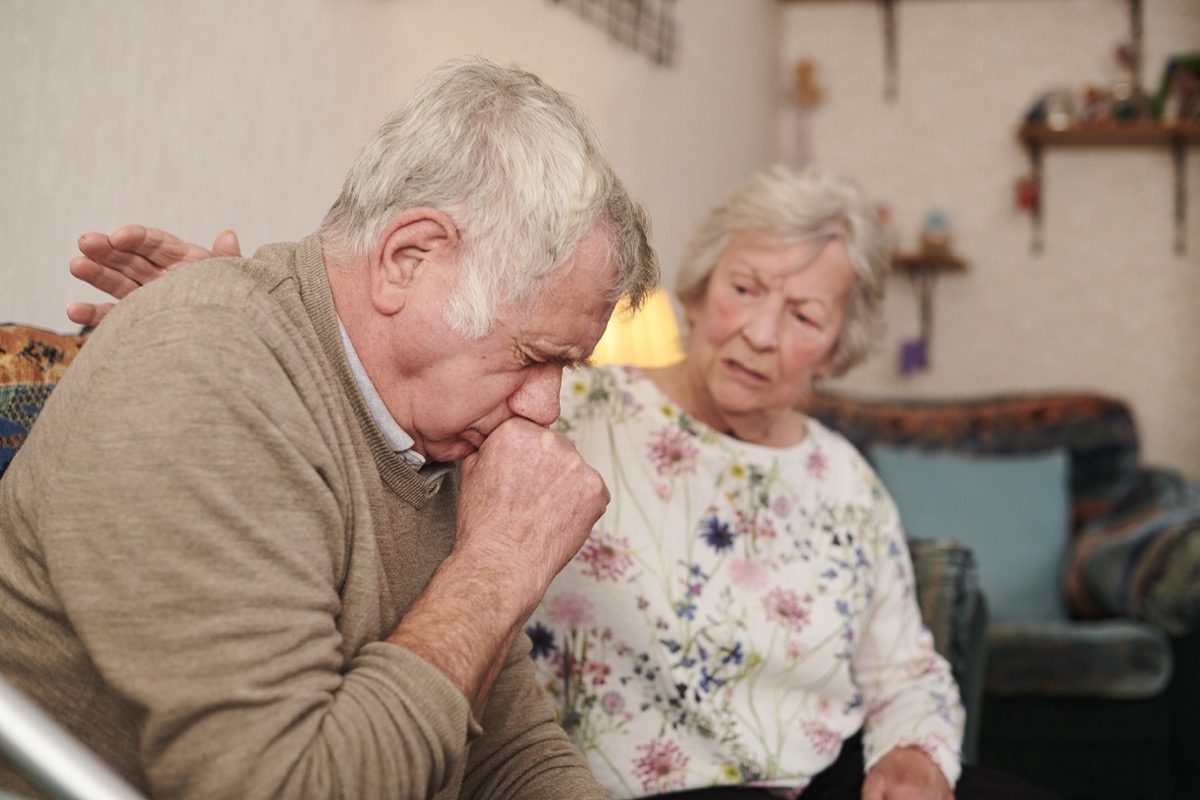Limbaugh and Dole join a staggering number of Americans who will be diagnosed with the disease in their lifetime; according to the American Cancer Society, approximately 235,760 new cases of lung cancer will be diagnosed in the U.S. in 2021 alone, and the disease will likely cause close to 132,000 deaths this year. The devastating effects of lung cancer make it of the utmost importance to catch and treat the disease early—when the cancer is still localized to the lungs, the five-year survival rate is 63 percent, but that number drops to just 7 percent when the disease has spread to distant parts of the body. If you want to protect yourself, read on to discover the lung cancer symptoms you can’t afford to ignore. And for more warning signs to be aware of, These Are the Warning Signs of Throat Cancer You Need to Know.
If you’re having trouble completing workouts that were once a breeze, you might want to check in with your doctor. According to Michael Chen, MD, an internal medicine physician with Ezra, “your immune system can recognize lung cancer and then produce an antibody response that causes an autoimmune disease called Lambert-Eaton myasthenic syndrome (LEMS).” This disease causes the body to attack its own tissues in the area where nerves and muscles meet, which results in muscle weakness. And for the latest health news delivered straight to your inbox, sign up for our daily newsletter.
If your upper body looks suddenly swollen without any explanation, it’s time to consult a medical professional. “The vena cava is the major vein that drains deoxygenated blood back into your heart,” explains Chen. However, when a tumor in your lung gets big enough, it can physically compress the vena cava. This phenomenon, known as superior vena cava syndrome (SVCS), causes decreased blood flow to the heart and the rest of the body, which can result in swelling in the face, neck, upper body, and arms.
Lung cancer can sometimes lead to hormonal imbalances that cause Cushing’s syndrome, a disorder characterized by too much cortisol in the bloodstream, Chen says. A symptom of this syndrome is the face becoming rounder and wider, a condition colloquially referred to as “moon face.” And if you want to play it safe, check out these Warning Signs of Head and Neck Cancer You Need to Know.
Don’t immediately assume that chest pain is indicative of heart issues. The lungs are lined by a membrane called the pleura, and according to Chen, “if lung cancer is irritating this lining, it can cause pain that you feel in your chest.” In some cases, lung cancer develops on an area of the lung called the superior pulmonary sulcus. When these tumors occur, more telltale signs like coughing don’t appear until late in the disease. Instead, “the most common initial symptom that can be present in up to 96 percent of patients…is shoulder and arm pain,” says Francesco-Maria Serino, MD, PhD, the founder of Doctors in Italy. And for more symptoms that merit serious attention, check out these 25 Common Pains You Should Never Ignore.
Lung cancer can literally have an impact from head to toe. According to Andrea McKee, MD, the American Lung Association’s national spokesperson, the disease can spread to the brain and cause headaches, seizures, memory loss, and personality changes. And if that throbbing pain in your head has you concerned, This Is How to Tell If Your Headache Is COVID, Study Says.
“Lung cancer can spread to the bones,” explains McKee. Indeed, the Rogel Cancer Center at Michigan Medicine notes that this type of cancer is one of the most common culprits behind bone metastases, or cancer spreading to the bones. These “bone mets” often result in weakness that can lead to fractures.
COVID isn’t the only disease that could be causing those persistent blood clots. “Blood clotting disorders can happen in anyone who has an underlying cancer,” says McKee. And they do: According to the North American Thrombosis Forum, blood clots occur in as many as 20 percent of cancer patients.
Everything from pneumonia to injury may cause you to cough up blood, but in some cases, a lung cancer diagnosis is what’s behind this alarming symptom. “[A] tumor invading blood vessels in the lung can cause hemoptysis or coughing up of blood,” says McKee. Pancoast tumors—a rare form of lung cancer defined by its ability to affect nearby tissue—sometimes cause a group of nerve-related symptoms known as Horner syndrome, according to the American Cancer Society. The symptoms of Horner syndrome include drooping or weakness of one upper eyelid, a smaller pupil in the affected eye, and little or no sweating on the affected side of the face.
COVID isn’t the only condition that could have you struggling with persistent pneumonia. Lawrence Shulman, DO, chief of the division of pulmonary and sleep medicine at ProHEALTH Care, says that if you’ve received a recurring diagnosis of pneumonia in the same area of the lung, it could be a sign of lung cancer. Johns Hopkins Medicine also notes that any recurring respiratory infections could be a symptom of lung cancer, so make sure to consult your primary care provider if you feel like you’re getting sick particularly often.
Finger clubbing—defined by club-like changes in the shape of your fingers and fingernails—can be a sign of lung cancer, according to Cancer Research UK. Thirty-five percent of people with non-small cell lung cancer experience this symptom. Finger clubbing happens in stages: First, the nail bed becomes soft and the skin next to the nail bed is shiny; then the fingernails curve more than normal; and finally, the ends of the fingers become larger until they’re bulging.
Shortness of breath is often attributed to age or a sedentary lifestyle. However, oncologist Adil Akhtar, MD, notes that in some cases, this can be a silent sign of lung cancer.ae0fcc31ae342fd3a1346ebb1f342fcb
A cough that won’t go away is certainly unpleasant, but COVID is likely the issue that first comes to mind when you experience this unpleasant health problem. However, “A chronic cough [can be] due to irritation caused by cancer,” Akhtar explains.
You shouldn’t brush off that persistent fatigue, especially if it comes in conjunction with other lung symptoms. “Fatigue can be an early symptom that is not commonly attributed to lung cancer,” Akhtar says.
According to the American Cancer Society, unexplained appetite loss and weight loss can both be signs of lung cancer. However, these symptoms are commonly seen in patients with other chronic illnesses, so talk to your doctor before jumping to any conclusions.
If you or others notice that your voice has become more hoarse, raspy, or high-pitched, The Lung Cancer Foundation of America recommends getting checked out, as it may be a sneaky symptom of lung cancer.
Dizziness or limbs that become weak or numb are signs of lung cancer that tend to emerge once the illness is in its advanced stages, according to The Cancer Treatment Centers of America. Other symptoms that are more common during these advanced stages are jaundice and lumps in the neck or collarbone region.
Many people with lung cancer experience high levels of calcium in their blood, according to the American Cancer Society. As a result, lung cancer patients often deal with insatiable thirst and frequent urination.


















